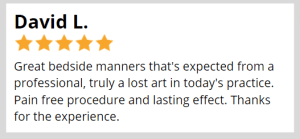
Sometimes, you don't know how serious your neglected shoulder injury can get before you need the help of a shoulder injury specialist. The question you might have is: how would I know when to see a shoulder injury specialist for my shoulder injury? Shoulder and elbow injuries often result from a serious fall leading to shoulder pain, hearing a clicking or popping sound in your shoulder, noticing a bruise or a bump, or experiencing immobility.
Some shoulder pain can be ignored and will get better on its own over some time. This method could work for most people, but it might be a bad idea for serious types of shoulder and elbow injuries.
Considering the range of motion a shoulder has, it's perhaps not too surprising how common shoulder pain is—it's estimated about 7.5 million people a year see a shoulder injury specialist for shoulder pain, and many more manage the pain at home.

Your shoulder allows you to move your arms from side to side, forward and backward, and above your head. A painful shoulder injury can occur from repetitive motions or acute, sudden injuries; chronic illnesses like arthritis can also damage the joint. Here are the most common reasons people experience shoulder pain:
Shoulder tendinitis typically happens from a repetitive motion. Occasionally, a more sudden, unexpected injury could cause the issue. It's common in athletes, especially those who might inadvertently use the incorrect form, putting additional stress on the tendons and tissues in the shoulder.
Therapy for shoulder tendinitis focuses on regaining mobility and decreasing the discomfort caused by pain and swelling. Rest and ice on the shoulder is an excellent start — it will help reduce the swelling. Physical therapy could help relieve the symptoms and help regain strength in the shoulder. Surgery is often only needed if the tendon has been partially or wholly torn.
Shoulder bursitis happens when the small fluid-filled sacs (bursae) cushion and protect bones, muscles, and tendons become inflamed. The shoulder is among the most common for bursitis, often in joints that conduct repetitive motions.

This condition can also cause swelling and stiffness, aside from a general ache in the shoulder. It may be inconvenient or even painful when you move your shoulder or apply pressure to it. If pain is persistent, you should consult a doctor about developing a course of treatment and pain management.
Your shoulder injury specialist may likewise recommend medication to reduce pain and inflammation, therapy to strengthen and fortify the muscles in the shoulder, and even injections to reduce severe inflammation, or surgery. Surgery is rarely required in bursitis treatment.
Rotator cuff tears are common, especially in middle-aged people who perform repetitive overhead motions at work or while playing a sport. Tears can occur over time due to wear and tear or a sudden accident or injury.
Most describe the pain from a rotator cuff tear as a dull ache that gets worse if you sleep on the affected shoulder. The tear can make it hard to reach behind your back to do daily tasks like brushing your hair. It may also make the arm feel weak.
If you suspect a rotator cuff tear, it's recommended that you make an appointment to see a shoulder injury specialist. There are a lot of options for rotator cuff tear treatment, but they are generally more effective if the injury is diagnosed early.
At your appointment, your shoulder injury specialist will talk to you about your symptoms. More testing, such as an ultrasound, MRI, or X-ray may be utilized to confirm the doctor's diagnosis and assess the severity of the shoulder injury.

Your shoulder injury specialist might also recommend physical therapy to improve the strength in your shoulder.
Injections are an option to help lessen the pain, although it's important to remember that even though the pain may be gone, the underlying issue is not. Surgery can help repair the tendon and, if necessary, replace the shoulder joint.
The frozen shoulder doesn't occur suddenly — it gradually worsens, causing pain and stiffness in the shoulder joint.
People at risk for this condition have had a medical situation or procedure that limits movement in the arm, for instance, somebody who has had a stroke or a broken arm. It's also more common in people over 40 and is seen more often in women than men.
A frozen shoulder usually gets better on its own within 12 to 18 months; however, physical therapy can help maintain and recover mobility within the shoulder. Corticosteroid injections could help manage pain, although these injections are often more useful in the early stages of frozen shoulder. Surgical options for frozen shoulder aren't standard, but there are options should this be the course of treatment best for you.
A fall, particularly if you land on an outstretched hand, can stretch or tear the joint's ligaments, causing a sprained shoulder.
Strained shoulder muscles are caused by overuse or sudden increase in use.
The most common type of arthritis that affects the shoulder is osteoarthritis.
Most shoulder fractures occur when you fall and land on an outstretched hand.

A separated shoulder can occur if you fall on your shoulder or your shoulder is hit with a strong force. The ligaments that attach your shoulder to your collar bone become stretched or torn.
A shoulder dislocation is different from a shoulder separation. A strong blow to the shoulder can force the humerus ball out of the shoulder socket. A dislocation can be partial or total.
Listed below are the five indications that should be observed before setting an appointment with a shoulder injury specialist.
After an intense fall, you can hear a popping sound in your shoulder, followed by severe pain or shoulder weakness. That might be a tear in your rotator cuff or an AC joint separation. When you hear the popping sound after a fall, you must see a shoulder injury specialist immediately before your injury worsens.
Shoulder weakness after injury may be due to a ruptured or torn rotator cuff. That is usually caused by a sudden force being exerted onto the shoulder. Large tears on the rotator cuff usually cause weakness, especially when trying to lift your arm. If you are experiencing this, it's time to see a shoulder injury specialist.
If you lack stability in your shoulder after getting injured, it means that your shoulder is most likely dislocated. Sometimes, a dislocated shoulder will slide back to its place immediately after getting up from the ground. Some will not – this is when you need to be seen by a shoulder injury specialist.

You might notice a bump on the top part of your shoulder after a sudden fall. A bump always comes with severe pain, indicating only an injury in your AC joint or a shoulder separation. Most AC separation cases do not require surgery, but a doctor's evaluation is necessary to assess which type of AC separation you have.
Once the shoulder injury specialist determines which type of AC separation you have, you will know if your shoulder injury is serious or if it just needs time to recover on its own.
A sudden fall onto your shoulder transmits the force to your clavicle (collarbone), which can make it fractured. After the injury, you may notice a bump over your clavicle and severe pain in that area. It is important to have a shoulder injury specialist evaluate your type of fracture to receive the proper care before the injury worsens.
Most shoulder injuries can worsen when left untreated. That is why it is important to immediately see a shoulder injury specialist if you are experiencing any (or all) of the five indications mentioned above.
Shoulder pain can interfere with your life, from work and play to sleeping. It's important to check your shoulder if your pain doesn't go away because with some injuries, such as frozen shoulder, the longer you wait for medical help, the harder it can be to treat the problem.
If you have shoulder pain or swelling and it's not going away, speak with your shoulder injury specialist about your diagnosis and treatment options.